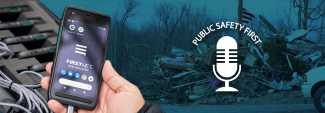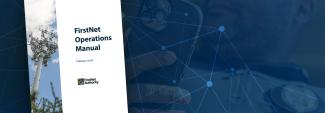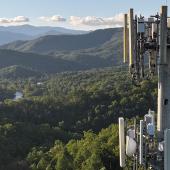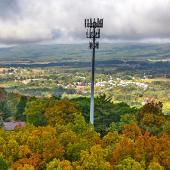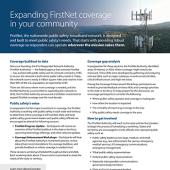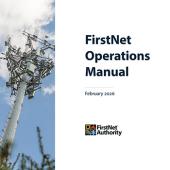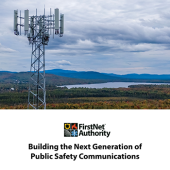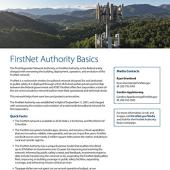Summary
Sheriff Neil Miller of the Buffalo County Sheriff’s Office in Nebraska began implementing mobile data more than 20 years ago, and he continues to bring advanced technologies to increase the efficiency of operations for deputies. With FirstNet being built out throughout the state of Nebraska, deputies and other first responders are able to spend more time in the communities they serve.
Guest
Dave Buchanan
FirstNet Authority Executive Director of Public Safety Advocacy
Sheriff Neil Miller
Buffalo County Sheriff’s Office, Nebraska
Transcript
Preview
Narrator: You're listening to Public Safety First, a podcast to help you learn about the First Responder Network Authority and how you can be part of the future of public safety technology.
And now, your host.
Narrator: You're listening to Public Safety First, a podcast to help you learn about the First Responder Network Authority and how you can be part of the future of public safety technology.
And now, your host.
Dave Buchanan: Welcome to the Public Safety First podcast. I'm your host, Dave Buchanan, and I'm pleased to be joined today by Sheriff Neil Miller of the Buffalo County Sheriff's Office in Nebraska. Sheriff Miller is a true leader in the field of public safety communications. Almost 25 years ago, he was implementing mobile data, making it possible for deputies to run warrants, registration checks, and reports from their patrol vehicles. Fast forward to 2014 and he launched Text to 9-1-1 in Buffalo County so that residents can text 9-1-1 emergency call takers from their mobile devices. He also played a pivotal role in implementing a combined radio communication system for Nebraska's law enforcement, fire, and emergency medical services. In 2019, he was recognized for his efforts with the prestigious National Harlin McEwen Public Safety Broadband Communications Award. Sheriff Miller, thanks so much for joining us here today.
Sheriff Neil Miller: Good morning, Dave, and thank you for having me.
Dave Buchanan: Tell us a little bit about your background. How did your career in public safety start and how did you get involved in leading communications and technology initiatives so many years ago?
Sheriff Neil Miller: Well, this year started my 45th year in law enforcement. I was 19 years old when I started and after graduating from high school, I had an interest in the electronic side of the world. I also had a very deep desire to serve in law enforcement. I got into law enforcement and the technology side was a natural fit for me. So, I was able to have both those dreams that I wanted. And it's been that way for me, the whole 45-year career that I've had. And so, I feel very fortunate to have been able to do all the things I wanted to do. And it's exciting to look to the future and see all the things that are coming at us.
Dave Buchanan: We understand you in the Buffalo County Sheriff's Office are now FirstNet subscribers. Can you tell us about the decision to join FirstNet?
Sheriff Neil Miller: Sure. You know, when FirstNet was first announced, there was a lot of attention being paid to how we were going to do a nationwide communications system. It wasn't real clear how it would exactly look. But we knew that we needed to have that. We've been on broadband for quite some time, wireless broadband with another carrier just waiting for FirstNet to, kind of, mature in our area. When it was announced that AT&T and FirstNet would partner, that first thought was a little bit disappointing to us because we had no coverage from AT&T in Nebraska. It was very limited. So, we weren't sure how that was going to work out. We've been so pleased with how FirstNet has deployed sites across the state of Nebraska. AT&T has done a remarkable job of getting us coverage. It has been an aggressive build out. We're fortunate to have brand new infrastructure and Band 14. So, the whole state is covered in Band 14. And we're very pleased with how this has turned out. And so, it's been exciting to see this all happen. Quite honestly, it's amazing the benefit that this is providing to public safety and first responders.
Dave Buchanan: So, a lot of agencies join for different reasons. Sometimes there's an operational reason. There may be a technical reason. Maybe you're going through a technology change or you see the future in technology and the benefits of advanced technologies for public safety. Or maybe there's a business reason – the cost associated with the way you deliver communication services. Do you have any insight you could share with our listeners about your thinking about FirstNet with respect to those three vantage points?
Sheriff Neil Miller: Sure. We kind of need to go back to why did we do broadband in the first place? What was the benefit to us when we decided to adopt broadband in all of our patrol vehicles? And it really comes down to – it's a force multiplier for us. If you go back into the 90s when they had the COPS [Office of Community Oriented Policing Services] MORE grants, the whole idea behind the grant was Make Officer Redeployment Effective – MORE. That's where that came from. And so, for us, the challenge was getting the deputies out into the field. You can't have community interaction if you're at the law enforcement center. You've got to get out with the public. But the dilemma always was, how do we get them all the things they need? Because their office is their car. So, when they get in their office with four wheels, how do we get them everything they need to be able to do their job? We wanted to have it so that when they sat in their office, their car, it would be no different than have everything they needed the same as that they were sitting at the law enforcement center.
So, how does that happen? That happens through wireless broadband. It effectively helps us keep our staff out in the field, makes them as efficient as they can be. It increases our interaction with the public. And I think right now that's really an important piece for law enforcement, is to be out there interacting with the public and spending time in the communities and just having discussions. Wireless broadband allows them to be able to do everything they need to do from their vehicles. So, we have embraced wireless broadband for a number of years. We now, with FirstNet coming up in the coverage that we've seen build out in Buffalo County and the state of Nebraska, we're just so fortunate to be able to have that bandwidth out there for them to be able to do whatever it is they need to do. We use that for our officers doing their reports, doing citations, calls for service or CAD [computer aided dispatch] calls that come up on the screen and dispositioning calls from their cars. We send photographs back to evidence. So, if they take photographs in the field, still images, we're able to ship them back. We do digital recording of their supplemental reports. Once those supplemental reports are completed, those are shipped back to the law enforcement center.
Dave Buchanan: So, it seems to me like you have done very well with looking at technology as a process improvement for how you deliver law enforcement services in Buffalo County. What opportunities do you see for your agency as you look forward?
Sheriff Neil Miller: We're always looking to see where we can use technology to improve our ability to deliver service. And so, I can see with, especially with the broadband speeds and the bandwidth that's coming and moving into the 5G world, that opens up quite a number of opportunities for us in the video world. You know, video right now, we're using LTE for some video, but it's limited. With 5G out there, I can see us being able to do some live streaming of incidents for situational awareness. So, I think that there's a lot that's going to happen for us in the future with broadband, especially with those speeds and the capacity that we're going to be able to see with 5G.
I think that we're going to be looking at all of our processes to see where we can improve the processes or the functions that are services that we're providing. I think that we'll start to explore all of those to see how we can do a better job both in efficiency and in the cost of providing the service, because we currently have a very, very affordable solution for broadband services, and with FirstNet and the cost of FirstNet, with unlimited data usage, with priority and preemption, there are just a lot of opportunities for us that not have not even been thought about yet.
Dave Buchanan: We're seeing a lot of the agencies exploring how to tie FirstNet's LTE system with their existing LMR [land mobile radio] systems. Can you share what Buffalo County is doing in this regard?
Sheriff Neil Miller: Sure. One of the things that Nebraska's got, we have a LMR system, a statewide system that is managed by the OCIO [Office of the Chief Information Officer] for the state of Nebraska. There are agreements in place that you can be a user of that system or you can be a partner on that system. We signed an agreement with the state to partner with them so that we could share core services to the radio system. And in exchange for that, we would share our coverage and 800 megahertz that we're going to stand up with users on the state radio system. One of the things that when we're designing the system that we looked at was the number of towers it was going to take for an LMR system to give us the kind of coverage that we needed county wide. Buffalo County's got approximately 1,000 square miles to cover, and some of that's pretty rough terrain in the northern part of the county. So, when we were looking at this it was like convergence of devices. How do we do this and get FirstNet and LMR into a single device? Well, we will go to an LMR site if the site has got good signal for that particular portable. We will go to an LTE site if it does not. The beauty of that is that our towers and the FirstNet towers don't all end up in the same place. So, it gives us, really, a multiplying factor on what our coverage is going to end up being. And we've been very, very happy with that so far for in-building coverage as well as rural coverage in Buffalo County.
The other thing that we're using FirstNet for is on our radio sites, we have to have two paths for that audio to get back. So, we need two ways to get whatever that radio site hears back to the core at the state. The first path that we've got is with fiber. We have fiber to all of our sites. And then in the Kearney area, we've got microwave. But on our more rural sites, we're going to be implementing failover to FirstNet through a router and then back to the state core. We started looking at this option and we've been working with the FirstNet team to do this. And the state of Nebraska wants to be able to do the same thing. So, we have a joint interest in providing that backhaul for those sites. Some of them are pretty rural. There's no fiber to them. And so, we're excited for the fact that it is a reasonably priced option to allow us to have a redundant path in case we get a fiber cut.
Dave Buchanan: It's my observation that some of our public safety leaders have taken a more passive role when it comes to communications and technology and others have taken a more visionary role where they set the vision and then they get out of the way and let the communications people take the lead. It seems to me you've got a third path here, which is more hands-on role. Tell me a little bit about your role as the sheriff and as the leader of your law enforcement agency in driving these technology efforts forward and the progress you guys have made.
Sheriff Neil Miller: I am very hands-on on the technology side of this thing, I try to keep current with what's going on in the technology world so that I can be a valuable member of the team. I have a great team that work with me. We're also co-located with the Kearney Police Department. That's been a great partnership that we have had working out of the same building side by side for the last 25 years. And we feel very fortunate for that relationship because we share everything. We're involved together with things, the new radio system is a joint venture for that. They're getting ready to switch over to FirstNet. And so, they're looking to see how things are going with us and, kind of, have us kick the tires a little bit and we take turns with who's going to feel the pain of new technology and be out there on the leading edge to test it out. And it works well because we get to benefit from what the other does. So, you know, I believe in partnerships. I think that partnerships combined with technology allow us to best serve the people. At the end of the day, we're not here for ourselves. We're here for the people that we serve. And so, I very much am a believer in partnering and I'm a believer in using technology. And in order to do that, I need to understand the technology. So, I invest quite a bit of time just learning as new products come out to try and get an idea of how things work and what might be available to help us meet our mission.
Dave Buchanan: We know Buffalo County is also using FirstNet as a backup for the 9-1-1 system. Can you talk a little bit about this project and why it's so important for you?
Sheriff Neil Miller: Sure. We have a region that is a host remote configuration for 9-1-1. So, we have two hosts and we have about 20 other PSAPs [public safety answering points] that are a part of our region that are remotes to those two hosts. We're currently working with FirstNet to provide a backup to our fiber. Those remotes are all connected to the hosts with fiber. We've experienced some outages with that. And so, we came up with a plan where we would be able to use an alternate path for that with a tunnel through the internet. And that works. But it's the internet. And so, you have no control over the priority of the packets that traverse that route. With FirstNet as the primary failover, that's going to allow us to get our remotes and those other PSAPs, which are central Nebraska and in the panhandle of Nebraska, it's going to allow for them to remain connected to us even when we have a fiber cut. And we've experienced a couple of those where it has caused some disruption. We have a plan where those calls can be rerouted and delivered to a different PSAP. But the best possible outcome is that the 9-1-1 call ends up at the PSAP that it was intended to go to. And so, that's how we're going to use FirstNet is to back that up. And the state's also looking at it as a possibly a way to back up the whole state, to have a secondary route or the ability to have that call delivered over a different path to get back. So, this is a big project that we're currently working on and looking at for the state of Nebraska and as well as the south central and the panhandle region.
Dave Buchanan: We’ve heard firsthand from a number of agencies, especially in this last year, how those responsible for 9-1-1 centers and PSAPs were able to use FirstNet and how inventive some agencies got with using FirstNet, especially for remote work. I'm really glad to hear your story.
You know, one of the other areas that's really come to life for us in the last year and a half is using FirstNet for telemedicine and using FirstNet for those in the medical community. I understand your wife is a nurse and is also a FirstNet subscriber. Can you talk a little bit about how she has seen the network used in local hospitals?
Sheriff Neil Miller: You know, I think that that's our next group to really explain the benefit to. Our next goal or the work that needs to be done is to get to the medical community since they're eligible for FirstNet devices and to have the FirstNet experience with priority and preemption. We need to make sure they understand how that works. So, that will be the goal for us is to spend some time working with our healthcare providers and let them know that, for those that are providing emergency services, that they are eligible to be on FirstNet and that they should start looking at that to help them deliver those services that are critical to communities.
Dave Buchanan: So, we've spent some time recently speaking with other agencies about their use of FirstNet at times of emergency and planning for times of emergency, planning for special events, use of things like the deployable program, use of FirstNet Central and its capabilities to understand the network strength and health. Can you talk a little bit about any other FirstNet capabilities that you and your team have been able to take advantage of with respect to FirstNet?
Sheriff Neil Miller: We have had great success in the FirstNet Apps Catalog and talking with the people in Boulder who have put those apps through the paces and gathering information from them. An example of that would be our drone program. So, we have a number of drone pilots on the department. And the issue was how do we get the first responders that are in charge, the incident commanders, to be able to see what the drone sees? So, the pilots are busy flying. You've got your spotters out there spotting for the pilots. But that makes it difficult, then, for the fire chief or the police chief or the sheriff or the incident commander to be able to see what's going on. So, we went to the FirstNet Apps Catalog. And the folks in Boulder helped us on an app that they had tested and found to work well to be able to share live drone footage with those people at the scene. And so, we got that app as a result of the recommendation that they gave to us about what they thought might work for us. And all of the people around us are using that app because they like how it works as well. So, I think that, especially with some of the smaller agencies that don't have an IT department, don't have maybe the people who have the expertise to know what apps might be available to help them accomplish whatever it is they're trying to do, I think that's a valuable resource that can provide great help to public safety and first responders in getting the right app for the right purpose. So, we're very pleased with how that turned out.
Dave Buchanan: You've been familiar with our work at the FirstNet Authority for several years now. You've been involved in a number of our engagements and our Roadmap activities. Tell us a little bit about your impressions of the role of the federal government in overseeing FirstNet's build out, FirstNet’s evolution, and the future of FirstNet.
Sheriff Neil Miller: I think that that is a critical piece for public safety and first responders to the credibility of FirstNet. Other carriers have a board of directors that they have to make sure are happy with what the company's doing, how the profits are going, what the forecasting looks like for revenues for the next quarter. Our board of directors have experience in the fire service and EMS, in law enforcement, in the public sector, in 9-1-1. The FirstNet Board is very diverse and has a whole host of experience and knowledge in those things that impact first responders and public safety. So, as a user, I'm very happy to have the board of directors that we have for FirstNet because they're concerned about the experience. They're concerned about the affordability and they're involved in making sure that the coverage that we need is going to happen because they're in the trenches, a lot of them, every day doing the same thing the users are doing. I'm very happy that the federal government is involved in this process and that we're able to build this nationwide rollout of wireless broadband. I could not be more pleased in how this has rolled out and what it looks like right now. And I am excited for what the future looks like with FirstNet as the entity to provide broadband service for us and across the United States. It's exciting and I'm very appreciative of everything that the FirstNet Board does.
Dave Buchanan: Well, we've covered a lot of ground today. Sheriff, is there any other topics or issues that you wanted to share with our listeners today?
Sheriff Neil Miller: Let's not forget how FirstNet came to be. And that's 9/11. FirstNet came about as a result of the inability to communicate during 9/11. And I think that we have a responsibility to make sure that everybody understands what FirstNet can do and get that service out to the people whose lives depend on it.
Dave Buchanan: Well, this has been a terrific conversation, Sheriff Miller. I appreciate you taking time to speak with us today. Thank you for everything you do to keep the people of Nebraska safe. And thank you for being a leader nationwide with respect to public safety broadband. Thank you.
Sheriff Neil Miller: Thank you, Dave. It was a pleasure being here. And FirstNet is exciting, and I'm just happy to be a part of it. Thank you.
Narrator: Thanks for listening today. We're excited to have you join our podcast community. Make sure to subscribe on iTunes, SoundCloud, and YouTube. You can learn more about the First Responder Network Authority at FirstNet.gov and learn about FirstNet products and services at FirstNet.com.


